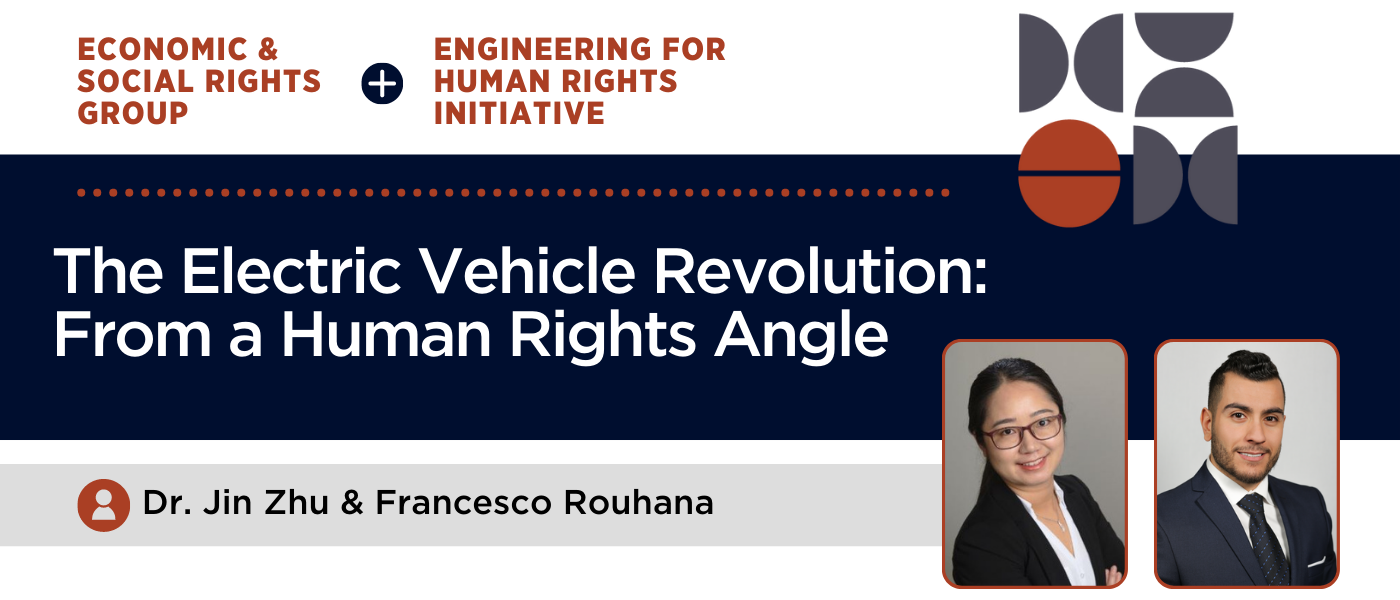Thursday, April 20, 2023
12:00pm - 1:15pm
Hybrid Event

About This Event
Abstract: Electric vehicles (EVs) have evolved rapidly owing to technological advancements and a growing interest in renewable energy to eliminate transportation’s dependency on fossil fuels and mitigate the effects of climate change. While EVs could revolutionize the transportation industry, they could jeopardize social equity and environmental stewardship efforts. Current studies on transportation electrification often fail to evaluate the EV revolution implications in human rights terms. International human rights law provides universally accepted norms, standards, baseline indicators, and modes of inquiry and reporting that could significantly advance and sharpen impact analysis. In this study, we explored the potential human rights implications that EVs pose for individuals and societies throughout their life cycle. Using the Universal Declaration of Human Rights and other human rights-based treaties as our baseline, we analyzed the existing and likely EVs’ impacts on human rights. We identified potential measures to address human rights violations. Stakeholders (governments, private sectors, civil society) need to work closely together to make the transition to low-carbon transportation more equitable and sustainable.
This event is co-sponsored by the Economic & Social Rights Group and the Engineering for Human Rights Initiative at the Gladstein Family Human Rights Institute.
Presenters
Dr. Jin Zhu
Assistant Professor
Civil and Environmental Engineering Department
University of Connecticut
Francesco Rouhana
Ph.D. Student
Civil and Environmental Engineering Department
University of Connecticut
About Dr. Jin Zhu
Dr. Jin Zhu is an Assistant Professor with the Civil and Environmental Engineering Department. Prior to joining UConn, she was a postdoctoral fellow at Zachry Department of Civil Engineering at Texas A&M University and before that she received her PhD in Civil Engineering and a Master in Public Administration at Florida International University. Her current research portfolio includes the complex systems engineering and management; system-of-systems integration; resilience quantification and simulation in infrastructure systems; and resilient communities. Her work on performance assessment of complex construction projects as system-of-systems has received the Best Paper Award from 2015 ASCE International Workshop on Computing in Civil Engineering, and 2nd Place Best Poster Award from 2016 ASCE Construction Research Congress. Dr. Zhu is the director of Resilient Interdependent Systems Engineering (RISE) Lab at UConn. The RISE Lab focuses on research that advances knowledge, methods, and data within and across diverse disciplines including civil engineering, complex systems science, network and graph theory, decision theory, organizational theory, and computer science.
About Francesco Rouhana
Francesco Rouhana is a PhD student in the CEE Department at UConn. He holds a bachelor degree in Civil Engineering and a master degree in Civil Engineering with a concentration in Transportation and Urban Planning from Notre Dame University – Louaize, Beirut, Lebanon. His research interests include resilience of civil infrastructure systems, disaster risk reduction, response and recovery.